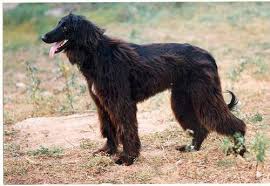
Taigan
Conditions of detention
Taigans are well-suited to cold, mountainous environments, where they have traditionally lived alongside their nomadic owners. They need ample space to run and exercise.
Useful Fact: These dogs are adapted to high altitudes and cold temperatures, making them excellent companions for outdoor activities in similar climates.
Nutrition and diet
Taigans require a high-protein diet to support their active lifestyle. Their traditional diet included raw meat, bones, and occasional plant materials.
Useful Fact: In modern settings, a diet rich in quality protein sources, such as lean meats and fish, helps maintain their muscle mass and energy levels.
Health
Taigans are generally healthy dogs with a robust constitution. They can be prone to common sighthound issues, such as bloat and joint problems.
Useful Fact: Regular veterinary check-ups and a balanced diet are crucial to maintaining their health, especially to monitor for breed-specific conditions.
Grooming and care
Taigans have a dense, medium-length coat that requires regular brushing to prevent matting and to remove loose hair. They do not need frequent baths.
Useful Fact: Their coat provides excellent insulation against cold weather, but it should be checked regularly for ticks and other parasites after outdoor activities.
Education and training
Taigans are intelligent and independent, which can make training a challenge. Positive reinforcement and consistency are key to successful training.
Useful Fact: Early socialization and training are essential to manage their strong prey drive and ensure they respond well to commands.
Toys and entertainment
Taigans enjoy toys that stimulate their hunting instincts, such as fetch toys and puzzle feeders. They also benefit from activities that allow them to run and chase.
Useful Fact: Interactive toys that mimic hunting can keep a Taigan mentally and physically stimulated, preventing boredom and destructive behavior.
Safety
Given their strong prey drive, Taigans should be kept on a leash or in a secure area when outdoors. They are prone to chasing small animals.
Useful Fact: A well-fenced yard is essential to keep them safe and to provide them with a space to run freely without the risk of running off.
Accessories
Taigans benefit from sturdy collars and harnesses designed for sighthounds, which help distribute pressure evenly and prevent injury.
Useful Fact: Using a sighthound-specific harness can prevent neck injuries and make walks more comfortable for your Taigan.
Socialization
Early and consistent socialization is important for Taigans to develop into well-adjusted adults. They can be aloof with strangers but are generally good with family members.
Useful Fact: Introducing them to a variety of people, environments, and other animals at a young age helps curb their natural wariness and promotes confident behavior.
Travel and Transportation
Taigans can travel well if accustomed to it from a young age. They need a secure, comfortable space in a vehicle and should be restrained for safety.
Useful Fact: Using a travel crate or a harness designed for car travel ensures their safety and comfort during trips.
Behavior and psychology
Taigans are known for their independence, intelligence, and strong prey drive. They form close bonds with their families but can be reserved with strangers.
Useful Fact: Understanding their natural instincts and providing outlets for their energy can help manage their behavior and ensure they are happy and well-adjusted.
Legal aspects
There are no specific legal regulations concerning Taigans, but owners should comply with general dog ownership laws, such as licensing and vaccination requirements.
Useful Fact: In some areas, owning a Taigan might require special considerations due to their hunting instincts, so checking local regulations is important.


